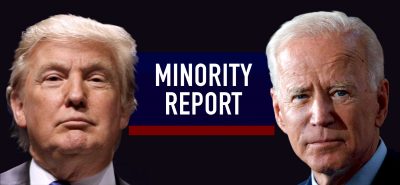One word has been thrown around a lot during the 2020 presidential race: “unprecedented.”

In some ways, the description is fitting. We are in the middle of a once-in-a-century pandemic that is affecting how people are voting. The number of early voters in 2020 is drastically higher than it was in 2016.
Many will still vote in person on Election Day, but concerns about lines and safety are legitimate. The reasons behind a high number of early, in-person voting and mail-in ballots are unquestionably related to the pandemic.
However, the fundamentals of the presidential election are precedented. Stop thinking of this race in terms of President Donald Trump. Think of it as a generic election.
The incumbent nominee is running during an economic catastrophe. As in the past, when this statement holds true, the incumbent candidate tends to lose.
If the polls stay steady, the standard rules that govern politics are still in effect. Even with all the partisan rancor, what voters care about most is how they fared under the incumbent’s administration. If the economy is faring poorly, voters usually retaliate against the incumbent party.
In 1932, America was in the middle of the Great Depression — the worst economic slump in our country’s history. The peak unemployment rate during the ’30s was estimated at nearly 25 percent, an abysmal mark.

Former President Herbert Hoover was elected just before the start of the Depression and was left to deal with the wreckage. Franklin D. Roosevelt subsequently annihilated Hoover in 1932 with an astounding 472 electoral votes to only 59 for the incumbent.
The results of the 1932 election are easy to interpret: Hoover oversaw the worst economic depression in American history. The people were not happy with how he handled it, so they voted for his opponent.
Now we face a different crisis as a nation: a pandemic. However, just because the causes of the current economic downturn are different does not mean the race’s fundamentals are too.
As much as I like former Vice President Joe Biden, if he wins, most of the credit belongs to his incumbent opponent.
We can see the depth of our current economic crisis in the extent to which our government has gone to help the economy and just how inadequate that response has been, despite its magnitude. Congress passed a $2 trillion stimulus fund, and it is still not enough.
The economy is terrible right now, and the signs make themselves known in both statistics and the eyeball test. Unemployment has doubled since last year, and I see economic rot all around me: businesses are closing, people are out of work, concerts are canceled, schools are closed and so much more.
If you had told me last year we would be in the middle of a recession that even a $2-trillion stimulus package couldn’t help, I would have told you Trump’s re-election chances were nonexistent.
When the economy is as bad as it is now, voters usually retaliate and punish the nominee from the incumbent president’s party. As much as people might say this election is “unprecedented,” the only unprecedented thing is the means by which people are voting. Political consultant James Carville’s “it’s the economy, stupid” will likely stand.
But would a Trump win be unprecedented?
In 1948, former President Harry Truman trailed Thomas Dewey by 5 percent in many of the national polls. Truman ultimately won the presidential election and carried the popular vote by about 4.5 percent.
As of Tuesday, Trump was losing by 8.4 percent in the FiveThirtyEight national polling average and 7.2 percent in the RealClearPolitics national polling average.
If the polls are as wrong about Trump in 2020 as they were about Truman in 1948, Trump could win the popular vote and follow Truman’s precedent of upsetting the national polls.
Trump’s chances of winning the Electoral College are very high if he wins the popular vote — FiveThirtyEight gives Trump a less than 1-percent chance of winning the popular vote but losing the Electoral College.
Additionally, Trump has demonstrably followed the example of Truman’s 1948 “Whistle Stop Tour.” Truman traveled around the country by train and gave speeches to appeal to people in person. Trump is following Truman’s example by making large, in-person rallies a centerpiece of his campaign, including a combined nine rallies across seven states on Sunday and Monday.
So, unlikely as it is, a Trump win in 2020 would not be a historical novelty, either.
No matter who the president-elect is, he will have followed a precedent. I hope and expect 2020 will follow the precedent set in 1932, not 1948, by sending a Democrat to the White House following an economic disaster that began under a Republican president.



















































































































